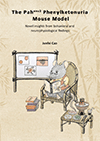PhD defence Junfei Cao

The Pahenu2 phenylketonuria mouse model
Novel insights from behavioral and neurophysiological findings
Phenylketonuria (PKU) is an inborn disorder where the body cannot properly break down an amino acid called phenylalanine (Phe), causing it to build up in the blood and brain, damaging brain function and changing behavior. While we already understand many effects of PKU, there's still much to discover about how it works and what symptoms it causes. This study used a special type of laboratory mouse (Pahenu2) that has PKU to better understand how high Phe levels harm the brain and body. The research focused on three main areas. First, it reviewed what scientists have already found about how PKU changes behavior in mice. Second, it explored how inflammation in the brain might lead to problems in a particular brain region called the striatum, which may explain some of the behavior changes. Finally, the study investigated how PKU affects brain activity and sleep patterns. The findings give new insights into how PKU impacts the brain and behavior, paving the way for further research into better ways to manage this condition, including alternative dietary interventions and other therapies.
